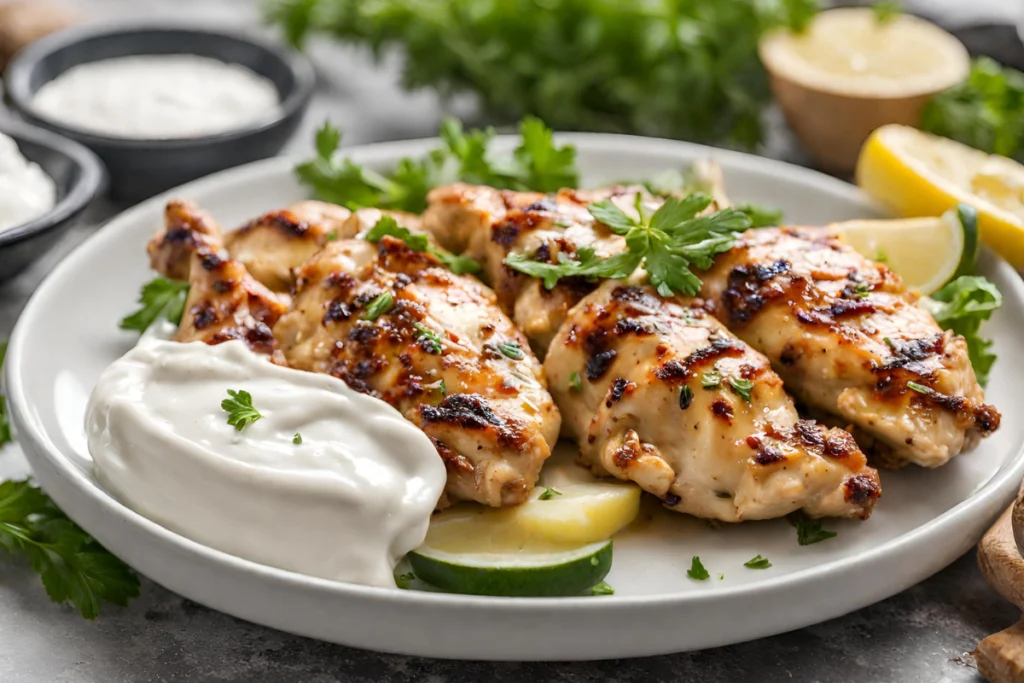
The Science of Marinating Chicken in Greek Yogurt
Marinating chicken in Greek yogurt goes beyond mere taste enhancement. It’s a culinary strategy, steeped in science, that enhances the texture and flavor of your poultry. But what exactly happens when you let chicken bathe in this creamy concoction?
How Greek Yogurt Transforms Chicken
The primary actor in this process is the lactic acid present in Greek yogurt. This mild acid gently breaks down the proteins in chicken, a process known as denaturation. This makes the meat more tender and receptive to flavors, allowing the marinade’s spices and herbs to penetrate deeply. The result? Every piece of chicken is infused with flavor and has a melt-in-your-mouth tenderness that can elevate any meal.
Moreover, the thickness of Greek yogurt creates a coating that locks in moisture during cooking, preventing the chicken from drying out. This means that whether you’re grilling, baking, or frying, the meat remains succulent and juicy, making every bite as delightful as the last.
Why Greek Yogurt Beats Other Marinades
When compared to other marinades, such as those based on vinegar or citrus juices, Greek yogurt offers a unique advantage. Its creaminess not only enhances flavor absorption but also moderates the acid’s impact, ensuring the chicken doesn’t become mushy—an often unwanted side effect of highly acidic marinades. Furthermore, Greek yogurt is packed with calcium and probiotics, offering additional nutritional benefits that other marinades can’t match.
Also, using Greek yogurt can be a healthier alternative to other fatty marinades. It’s low in calories yet high in protein, making it an excellent option for those looking to maintain a balanced diet without sacrificing flavor.
In essence, marinating chicken in Greek yogurt isn’t just a culinary technique—it’s a science that ensures your chicken is not only flavorful but also tender and healthy. So, next time you plan your meal, consider reaching for that tub of Greek yogurt; your palate and your muscles will thank you!
Preparing Your Marinade
Creating the perfect Greek yogurt marinade for your chicken involves more than just mixing a few ingredients. It’s about understanding the balance of flavors and how they meld to enhance the meat’s natural taste. Let’s dive into crafting a marinade that will turn your ordinary chicken into a dish bursting with flavor.
Essential Ingredients for a Greek Yogurt Marinade
To start, you’ll need a base of Greek yogurt. Opt for plain, unsweetened yogurt to control the flavors more effectively. The thickness of Greek yogurt not only helps in coating the chicken evenly but also ensures that the herbs and spices are well distributed.
Next, incorporate acids and aromatics. Lemon juice or zest adds a bright, citrusy note, balancing the richness of the yogurt. Garlic, either minced or in powder form, offers a sharp bite that complements the tang of the yogurt beautifully. For the herbs, you can’t go wrong with classics like dill, parsley, or mint, which provide freshness and a hint of green.
Spices are your next addition. A dash of paprika brings a subtle heat and smokiness, while ground cumin adds earthiness. Don’t forget a pinch of salt and pepper to enhance all the other flavors.
Mixing the Perfect Marinade
To ensure that each ingredient plays its part, start by whisking the Greek yogurt in a large bowl until smooth. Gradually add your lemon juice and spices, tasting as you go to maintain a balanced flavor profile. It’s crucial to mix these ingredients before adding the chicken to avoid uneven seasoning.
Once your base is ready, submerge your chicken pieces completely in the marinade. Make sure each piece is well-coated; this ensures the marinade works its magic evenly across all cuts. For best results, cover the bowl with a lid or plastic wrap and refrigerate. Marinating in a cold environment keeps the chicken safe and enhances the marination process, allowing the flavors to meld beautifully.
By following these steps, you’re not just seasoning the chicken, you’re transforming it. The marinade will penetrate the meat, infusing it with every nuanced flavor you’ve added. This preparation step is crucial because it sets the stage for how well the chicken will absorb the marinade’s flavors and how juicy it will remain after cooking.
Marination Time Frames
Determining the optimal duration to marinate your chicken in Greek yogurt is crucial for achieving the perfect balance of flavor and texture. Marinate for too little time and the flavors won’t fully penetrate the meat; marinate for too long, and you risk altering the texture of the chicken unfavorably. Let’s navigate through these time frames to ensure your chicken emerges from the marinade at its best.
Optimal Duration for Marinating Chicken in Greek Yogurt
For most cuts of chicken—whether you’re working with breasts, thighs, or drumsticks—the ideal marination time falls between 4 to 24 hours. This window allows the lactic acid in the Greek yogurt enough time to tenderize the meat effectively while enabling the flavors of your herbs and spices to meld and soak into the chicken, enhancing its intrinsic taste.
- Short-term Marination: If pressed for time, even short-term marination of at least 2 hours can be beneficial. This shorter period can still provide a noticeable improvement in the moisture and flavor of the chicken, especially if you’re planning a meal on the same day.
- Extended Marination: While it might be tempting to leave the chicken marinating for more than 24 hours, especially if you’re aiming for maximum tenderness, it’s important to be cautious. Over-marinating can lead to a breakdown in the texture of the meat, making it too soft and potentially mushy.
Signs of Over-Marination
Knowing when your chicken has marinated for too long is as important as ensuring it has enough time to soak up the flavors. If the meat starts to feel overly soft or begins to lose its fibrous texture, it’s likely been in the marinade too long. Additionally, if the surface of the chicken appears overly white or grainy, the acid has started to cook the meat, which is an indicator that it’s time to remove it from the marinade.
By adhering to these guidelines, you can ensure that your Greek yogurt-marinated chicken is not only flavorful but also has the perfect texture that makes each bite enjoyable. Always marinate in the refrigerator to keep the chicken safe from bacterial growth, and cover it to prevent it from absorbing odors from other foods.
Best Practices for Cooking Greek Yogurt Marinated Chicken
Once your chicken has marinated for the optimal amount of time in Greek yogurt, cooking it correctly is key to achieving the best flavor and texture. This section will guide you through various cooking methods suitable for Greek yogurt marinated chicken and provide tips to ensure that your culinary creation is as delicious as it is tender.
Choosing the Right Cooking Method
The method you choose for cooking your marinated chicken can significantly affect the outcome. Here are some of the best ways to cook Greek yogurt-marinated chicken:
- Grilling: Grilling is a popular choice that imparts a smoky flavor to the chicken, complementing the tanginess of the yogurt. Preheat your grill to medium-high heat and cook the chicken until it’s thoroughly done and has beautiful grill marks. Always ensure your grill is clean and lightly oiled to prevent sticking.
- Baking: For a hands-off approach, baking is ideal. Preheat your oven to around 375°F (190°C) and place the chicken on a lined baking sheet. Baking times will vary depending on the cut of the chicken but generally range from 25 to 45 minutes. The yogurt creates a crust that helps seal in moisture, resulting in a juicy finish.
- Pan-Frying: This method works well for thinner cuts or smaller pieces of chicken. Heat a bit of oil in a non-stick skillet over medium heat, and cook the chicken until golden and cooked through. The key here is not to overcrowd the pan, which can lower the temperature and cause the chicken to steam rather than sear.
Common Mistakes to Avoid
To ensure your Greek yogurt-marinated chicken turns out perfectly, keep these tips in mind:
- Avoid Overcooking: Chicken should be cooked to an internal temperature of 165°F (74°C), measured with a meat thermometer. Overcooking can dry out the chicken, negating the tenderizing effects of the yogurt.
- Discard Used Marinade: Never use the marinade that the raw chicken was in as a sauce unless it is boiled thoroughly first to eliminate any harmful bacteria.
- Resting the Chicken: Allow the chicken to rest for a few minutes after cooking. This lets the juices redistribute throughout the meat, ensuring that each bite is moist and flavorful.
By following these methods and tips, you can maximize the culinary potential of your Greek yogurt marinated chicken. Whether you choose to grill, bake, or pan-fry, the key is to maintain the delicate balance of heat and timing to preserve the tenderizing effects of the yogurt.
Tips for Flavor Variations
Diversifying the flavor profile of your Greek yogurt marinated chicken can elevate the dish to suit various global cuisines and personal tastes. Here are some innovative ideas to infuse unique flavors into your marinade:
Incorporating International Spices
- Indian Influence: Adding turmeric and garam masala can give the marinade an Indian flair, introducing a warm and aromatic experience.
- Middle Eastern Touch: Incorporate spices like za’atar and sumac for a Middle Eastern zest, enhancing the chicken with earthy and tart flavors.
- Latin American Style: Chipotle powder or cumin can lend a smoky and robust taste typical of Latin American dishes.
Experimenting with these spices not only broadens your culinary horizon but also adds a delightful complexity to the chicken.
Utilizing Fresh Herbs
- Mediterranean Herbs: Mixing in finely chopped rosemary or thyme can impart a Mediterranean vibe, ideal for a light and herbaceous flavor.
- Asian Aromatics: For an Asian twist, consider adding lemongrass or cilantro. These herbs bring a fresh and vibrant note to the marinade.
Fresh herbs tend to provide a more potent flavor and add a visually appealing element to the dish.
Experimenting with Citrus and Zest
- Citrus Variations: Lemon is a classic choice, but branching out to lime or orange zest can introduce a new layer of tanginess that complements the creamy yogurt beautifully.
- Combining Citrus: Using a combination of different citrus juices and zests can create a nuanced flavor profile that enhances the natural taste of the chicken.
Conclusion
In wrapping up our exploration of marinating chicken in Greek yogurt, we’ve traveled through the science behind the process, learned how to craft the perfect marinade, discussed optimal marination times, and explored the best cooking methods to ensure delicious results. Greek yogurt stands out as a marinade base not only for its flavor-enhancing qualities but also for its ability to tenderize chicken, making every bite succulent and flavorful.
Through experimenting with different herbs, spices, and citrus variations, we’ve seen how easy it is to adapt this method to suit various culinary tastes and preferences. Each ingredient plays a pivotal role in transforming the humble chicken into a dish that can steal the spotlight at any meal.
As you continue your culinary adventures, remember that the key to perfect Greek yogurt-marinated chicken lies in balancing marination time and cooking techniques to suit the specific cuts of chicken you’re using. By adhering to the guidelines discussed, you’re set to enjoy chicken that is not only infused with incredible flavors but also perfectly tender and juicy.
FAQs
How long can I leave chicken marinating in Greek yogurt?
You can marinate chicken in Greek yogurt for a period ranging from a minimum of 2 hours up to a maximum of 24 hours. The ideal marination time usually depends on the type of cut and personal preference. However, marinating beyond 24 hours can lead to the chicken becoming mushy due to the breakdown of proteins by the acids in the yogurt.
What does yogurt do to chicken when marinating?
Yogurt acts as a tenderizer when used in marinating chicken. The lactic acid present in yogurt gently breaks down the proteins in the chicken, making it tender and moist. Additionally, the fat in the yogurt helps to keep the chicken juicy during cooking, preventing it from drying out. The thickness of yogurt also helps in evenly distributing spices and flavors throughout the chicken.
What is Greek chicken made of?
Greek chicken typically consists of chicken marinated in a mixture of Greek yogurt, lemon, garlic, and traditional Greek spices such as oregano, thyme, and sometimes mint. Olive oil is often added to the marinade to help the flavors meld and to assist in cooking. This combination not only imparts a tangy and robust flavor but also tenderizes the chicken.
How many hours should you marinate chicken?
Generally, chicken should be marinated for at least 2 hours, but ideally for 4 to 24 hours. The exact marination time can vary based on the recipe and the desired intensity of flavor. Shorter marination times are sufficient for tenderizing and infusing flavor into smaller or thinner cuts of chicken, while longer times are better for thicker cuts or when a deeper infusion of flavor is desired.

